Class News
Tony Lavely ’64 on the Gulf Stream and climate change
Climate change is not a fish story
by Tony Lavely ’64
September 26, 2020
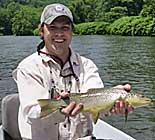
Every kid learns that a “fish story” is usually an exaggeration. Well, the threat to our planet and civilization from climate change is not a fish story! Nevertheless, let me tell you how unmitigated climate change is changing the oceans and all marine life. It’s personal for me, since I have experienced the bounty of the seas in my life. My father never took me fishing when I was a boy, because he wasn’t that keen on it. I’ve mainly fished with my son-in-law who is an avid fisherman. It’s not the “sport” that attracts me, however. Early in my business career, I made a lot of money selling fish and seafood, and I became a good student of the oceans as a result. Also, I love to cook fish, mainly whole, and I love to eat fish. I also enjoy looking at fish and have art book collections of them.
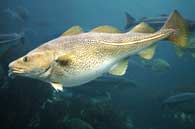
In 1970, I co-produced a movie about English fish and chips coming to America. I was given the task by John Y. Brown, Jr., the owner of Kentucky Fried Chicken.  He had just bought a fledging fish and chips chain in California, named H. Salt, Esq. To demonstrate the high quality of Icelandic cod that we used, I flew to Iceland with a production crew. From Reykjavik, the capital, we flew to Ísafjörður in the far northwest, one of the major fishing boat harbors.
He had just bought a fledging fish and chips chain in California, named H. Salt, Esq. To demonstrate the high quality of Icelandic cod that we used, I flew to Iceland with a production crew. From Reykjavik, the capital, we flew to Ísafjörður in the far northwest, one of the major fishing boat harbors. 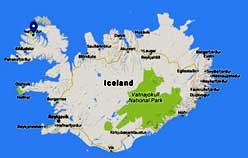 There, we boarded a 60-foot fishing boat and headed for the open ocean north of the Arctic Circle.
There, we boarded a 60-foot fishing boat and headed for the open ocean north of the Arctic Circle. 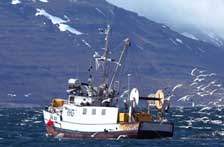 In those days, cod was caught by hook and line, and the lines were about a mile long. That method was much more sustainable for the fisheries than today’s trolling factory ships which vacuum the oceans and deplete fisheries. I took turns putting bait on the hooks as they were reeled out by high-speed machine.
In those days, cod was caught by hook and line, and the lines were about a mile long. That method was much more sustainable for the fisheries than today’s trolling factory ships which vacuum the oceans and deplete fisheries. I took turns putting bait on the hooks as they were reeled out by high-speed machine.  “Don’t let the hook get you on the way by, sonny, or you’ll be out there with the fish!” said one of the mates, ominously.
“Don’t let the hook get you on the way by, sonny, or you’ll be out there with the fish!” said one of the mates, ominously. 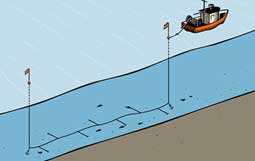 As we headed north, the temperature dropped. I think it got to the low 20s (F) on the deck, so I headed for the small boiler room to get some coffee. In the boiler room, it was 96 degrees. So, on average my fishing experience was a pleasant 60 degrees. I say this because, like global temperatures, in some places it’s very hot and other places it’s very cold. Averages are deceiving. It’s the balance between hot and cold on our planet that makes it the marvelous place it is.
As we headed north, the temperature dropped. I think it got to the low 20s (F) on the deck, so I headed for the small boiler room to get some coffee. In the boiler room, it was 96 degrees. So, on average my fishing experience was a pleasant 60 degrees. I say this because, like global temperatures, in some places it’s very hot and other places it’s very cold. Averages are deceiving. It’s the balance between hot and cold on our planet that makes it the marvelous place it is.
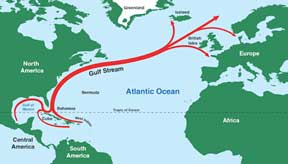
One of the most finely balanced and powerful forces on earth is the Atlantic Gulf Stream. Wikipedia: “The Gulf Stream influences the climate of the east coast of North America from Florida to Newfoundland and the west coast of Europe. Although there has been recent debate, there is consensus that the climate of Western Europe and Northern Europe is warmer than other areas of similar latitude because of the North Atlantic Current. It is part of the North Atlantic Gyre. The Gulf Stream is also a significant potential source of renewable power generation.”  Many species of fish select the Gulf Stream as their preferred habitat and move within it. In his 2008 book, The Gulf Stream: The Amazing Story of the Powerful River in the Atlantic, Stan Ulanski writes: “This oceanic river is like no river on land; its size, range, and power dwarf even the mightiest continental river. … It is hundreds of times the combined flows of the Amazon and Mississippi Rivers. The Gulf Stream owes its high temperature to the intense sun rays that heat the waters of the tropical Atlantic and Caribbean basins. The current is a large storage bin of energy. Climate change is threatening this balanced and powerful resource.”
Many species of fish select the Gulf Stream as their preferred habitat and move within it. In his 2008 book, The Gulf Stream: The Amazing Story of the Powerful River in the Atlantic, Stan Ulanski writes: “This oceanic river is like no river on land; its size, range, and power dwarf even the mightiest continental river. … It is hundreds of times the combined flows of the Amazon and Mississippi Rivers. The Gulf Stream owes its high temperature to the intense sun rays that heat the waters of the tropical Atlantic and Caribbean basins. The current is a large storage bin of energy. Climate change is threatening this balanced and powerful resource.”
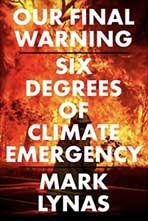
In his presentimental book, Our Final Warning: Six Degrees of Climate Emergency, Mark Lynas writes: “Today, the Atlantic Meridional Overturning Circulation (AMOC) of which the Gulf Stream is but a small component, continues to have an outsized impact on Europe’s climate. Whether the current weakening trend will continue is highly uncertain. But one thing we do know: AMOC collapse has happened before, and it has had drastic impacts on the climate of the entire Northern Hemisphere.”
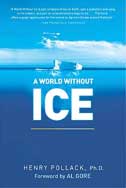
Henry Pollack, writing in A World Without Ice, echoes this concern: “The growth of CO2 in the atmosphere is only part of the story. More than a third of all the CO2 emitted by the global industrial economy enters the ocean, which effects we are only beginning to understand. Oceanic uptake of CO2 leads to a progressive decline in the pH of the water in the oceans, an indicator that the water is trending toward becoming a weak acid. As the Arctic warming continues, the Gulf Stream will weaken or shut down. The consequence? A deep and enduring chill would descend over Western Europe.”
 For my sister Kim, who has lived in London her entire adult life, global warming would mean living in a climate colder than the Arctic Circle is today. And for my friends in Florida, it would get even hotter with an encroaching coastline. David Fleshler, writing in Phys.org, said: “A weaker Gulf Stream could lead to higher sea levels along the Florida coast. Sea level worldwide is currently rising at a rate of about one inch every eight years, partly because of melting ice sheets and partly because water expands as it warms.” In an interview with the Earth Institute at Columbia University, Columbia Professor Arnold Gordon said: “Under human-induced climate change, the Gulf Stream is predicted to get weaker. It will flow more slowly and carry less water. There are some indications from satellites that it has been getting weaker since the 1990s.”
For my sister Kim, who has lived in London her entire adult life, global warming would mean living in a climate colder than the Arctic Circle is today. And for my friends in Florida, it would get even hotter with an encroaching coastline. David Fleshler, writing in Phys.org, said: “A weaker Gulf Stream could lead to higher sea levels along the Florida coast. Sea level worldwide is currently rising at a rate of about one inch every eight years, partly because of melting ice sheets and partly because water expands as it warms.” In an interview with the Earth Institute at Columbia University, Columbia Professor Arnold Gordon said: “Under human-induced climate change, the Gulf Stream is predicted to get weaker. It will flow more slowly and carry less water. There are some indications from satellites that it has been getting weaker since the 1990s.”

Back to the fish. With these changes in the Gulf Stream, the fish (and other seafood, like lobster) are leaving their traditional habitats. Josh Gabbatiss, writing in The Independent, said: “Hundreds of fish species will be forced to migrate northwards to escape the effects of climate change, putting global fisheries at risk. Sea creatures are highly sensitive to the temperature of water, and if it gets too warm, they will shift to areas that suit them better.” Writing in a science review for Marine Climate Change Impacts Partnership, three eminent scientists wrote: “Recent warming has caused some cold-water demersal (bottom-dwelling) species to move northwards and into deeper water (e.g., cod, whiting, monkfish), and has caused some warm-water demersal species to become more common or ‘invade’ new areas.” So, cod, “the fish that changed the world,” may become extinct.

Anthony M. (Tony) Lavely is a career food-industry marketing executive. In the 1980s he was EVP of Long John Silver’s, the largest seafood quick-service restaurant in the world. In his role as Secretary for the Yale Class of 1964, he publicizes the environmental work that has been done by classmates over the years.  Currently, Tony is engaged in a series of climate-change workshops with a curriculum developed by Elders Climate Action. He is also part of a small working group of Yale classmates to foster communications about climate change.
Currently, Tony is engaged in a series of climate-change workshops with a curriculum developed by Elders Climate Action. He is also part of a small working group of Yale classmates to foster communications about climate change.

